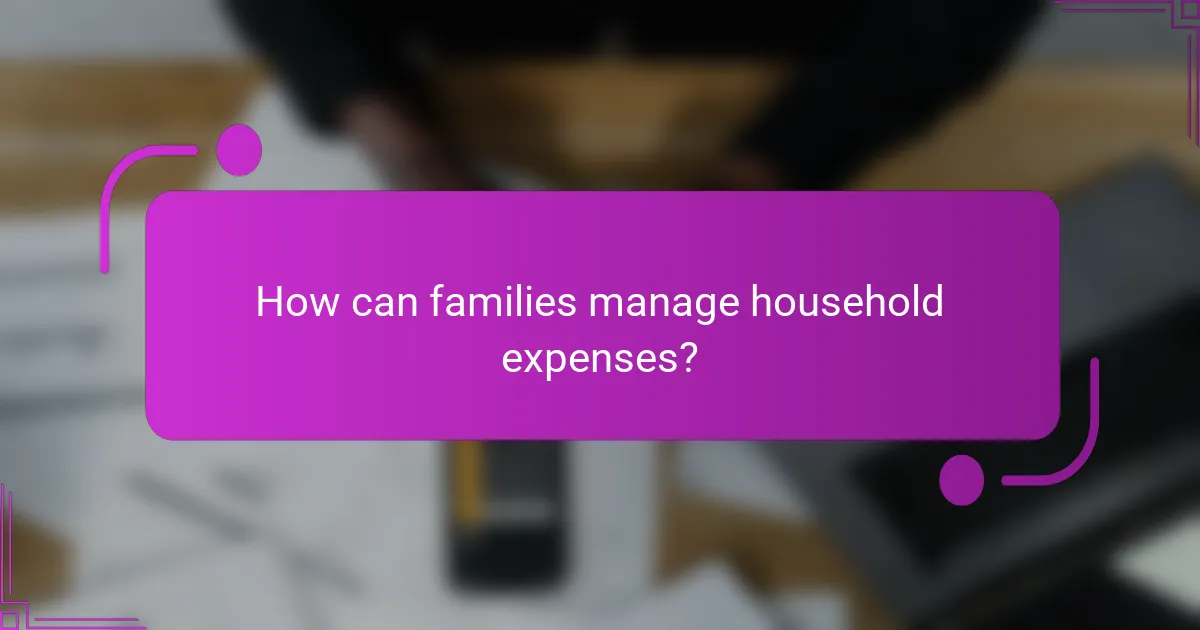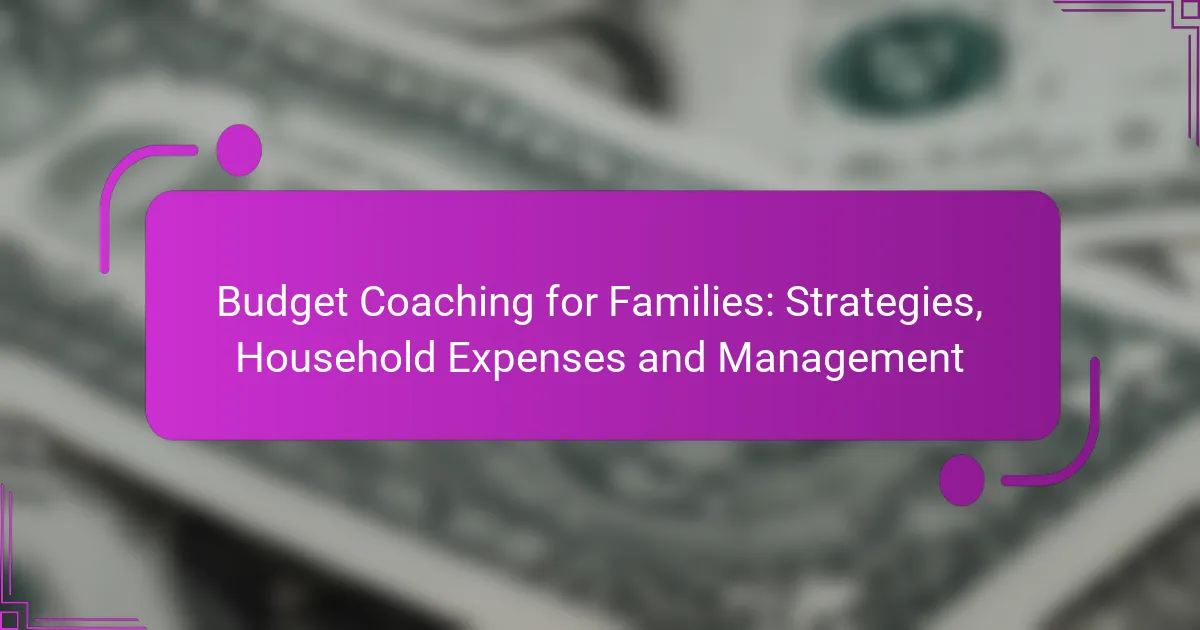Budget coaching for families is essential for managing household expenses and achieving financial stability. By implementing effective strategies such as tracking spending and reducing unnecessary costs, families can prioritize their needs while saving for future goals. Utilizing budgeting tools and apps can further streamline this process, helping families maintain a clear financial picture and stay on track with their financial objectives.

What are effective budget coaching strategies for families?
Effective budget coaching strategies for families help manage household expenses and improve financial stability. These strategies provide structured approaches to budgeting, ensuring that families can prioritize their needs while saving for future goals.
Zero-based budgeting
Zero-based budgeting is a method where every dollar of income is assigned a specific purpose, resulting in a budget that totals zero. Families start with their income and allocate funds to expenses, savings, and debt repayment, ensuring that no money is left unassigned.
This approach encourages careful tracking of all expenses and can reveal unnecessary spending. Families can benefit from reviewing their budget monthly to adjust allocations based on changing needs or unexpected expenses.
Envelope budgeting method
The envelope budgeting method involves dividing cash into envelopes designated for specific spending categories, such as groceries, entertainment, and utilities. Once the cash in an envelope is gone, no more spending is allowed in that category for the month.
This tactile method helps families visualize their spending and limits overspending. It can be particularly effective for families who struggle with impulse purchases or managing credit card use.
Cash flow management
Cash flow management focuses on tracking the inflow and outflow of money to ensure that expenses do not exceed income. Families can create a cash flow statement that outlines all sources of income and all fixed and variable expenses.
Regularly reviewing cash flow can help families identify trends, such as seasonal expenses or irregular income, and make adjustments to avoid financial shortfalls. Tools like budgeting apps can simplify this process by providing real-time insights into spending habits.
Goal-oriented budgeting
Goal-oriented budgeting aligns financial resources with specific family goals, such as saving for a vacation, a new car, or college tuition. Families set short-term and long-term financial goals and allocate funds accordingly in their budget.
This method helps maintain motivation and focus on achieving financial objectives. Families should regularly assess their progress towards these goals and adjust their budgets as necessary to stay on track.
Family financial workshops
Family financial workshops provide educational opportunities for families to learn about budgeting, saving, and investing. These workshops can be offered by community organizations, schools, or financial institutions, often at little or no cost.
Participating in workshops fosters open discussions about money management and encourages families to develop a shared understanding of financial responsibilities. Engaging in these learning experiences can empower families to make informed financial decisions together.

How can families manage household expenses?
Families can manage household expenses by tracking their spending, reducing unnecessary costs, and utilizing technology to stay organized. Implementing these strategies helps create a clearer financial picture and promotes better budgeting practices.
Tracking monthly expenses
Tracking monthly expenses involves recording all income and expenditures to understand where money is going. Families can start by categorizing expenses into fixed costs, such as rent or mortgage, and variable costs, like groceries and entertainment.
A simple method is to use a spreadsheet or a notebook to log daily spending. This practice can reveal spending patterns and highlight areas where adjustments can be made.
Reducing discretionary spending
Reducing discretionary spending means cutting back on non-essential expenses, such as dining out, subscriptions, and luxury items. Families should evaluate their spending habits and identify areas where they can make sacrifices without significantly impacting their quality of life.
For example, setting a monthly limit for entertainment and dining can help control costs. Prioritizing needs over wants can lead to substantial savings over time.
Utilizing budgeting apps
Budgeting apps can streamline the process of managing household expenses by providing tools for tracking spending and setting budgets. Many apps allow users to link bank accounts, making it easier to monitor transactions in real-time.
Popular budgeting apps like Mint or YNAB (You Need A Budget) offer features such as goal setting and expense categorization. Families should choose an app that fits their needs and encourages regular use to maximize its benefits.
Comparing utility providers
Comparing utility providers can lead to significant savings on monthly bills. Families should research available options for electricity, gas, and internet services to find the best rates and plans.
Many regions allow consumers to switch providers, so families should regularly review their utility bills and consider alternatives. Websites that aggregate utility rates can simplify this comparison process, helping families make informed decisions.

What tools can assist in budget coaching?
Several tools can significantly enhance budget coaching for families by simplifying expense tracking and planning. Utilizing apps designed for budgeting can help families manage their finances more effectively, ensuring they stay on track with their financial goals.
Mint for expense tracking
Mint is a popular tool that allows families to track their expenses in real time. By linking bank accounts and credit cards, users can categorize their spending automatically, providing a clear overview of where money goes each month.
To get started, families should create an account and connect their financial accounts. Mint offers budgeting features, alerts for unusual spending, and insights into spending habits, making it easier to identify areas for improvement.
You Need a Budget (YNAB) for planning
You Need a Budget (YNAB) focuses on proactive financial planning by encouraging users to allocate every dollar they earn. This method helps families prioritize their spending and save for future expenses, creating a more intentional approach to budgeting.
Families can benefit from YNAB’s unique features, such as goal tracking and real-time collaboration with family members. The app requires a subscription, but many users find that the accountability it fosters leads to better financial outcomes.
EveryDollar for monthly budgeting
EveryDollar is designed for straightforward monthly budgeting, allowing families to create a zero-based budget quickly. Users can manually input their income and expenses, ensuring that every dollar is assigned a purpose.
This tool is particularly useful for families who prefer a simple, hands-on approach to budgeting. EveryDollar offers a free version, but the paid version provides additional features like bank syncing, which can save time and enhance accuracy.

What criteria should families consider when choosing a budget coach?
Families should consider a budget coach’s experience, coaching style, and client feedback to ensure they find a suitable match for their financial goals. Selecting a coach who aligns with your family’s values and needs can significantly impact your budgeting success.
Experience and qualifications
When evaluating a budget coach, look for relevant experience and qualifications in personal finance or budgeting. A coach with a background in financial planning or a certification from a recognized organization can provide valuable insights and strategies.
Additionally, consider how long the coach has been working with families specifically. A coach with several years of experience may have encountered a variety of financial situations and can offer tailored advice based on past cases.
Coaching style and approach
Each budget coach has a unique coaching style and approach, which can greatly influence the effectiveness of their guidance. Some coaches may focus on strict budgeting techniques, while others might emphasize flexibility and adapting to changing circumstances.
Families should assess whether they prefer a hands-on coach who provides detailed plans or a more hands-off approach that encourages independence. Understanding the coach’s methodology can help determine if it aligns with your family’s financial philosophy.
Client testimonials and reviews
Client testimonials and reviews offer insights into a budget coach’s effectiveness and reliability. Look for feedback from families with similar financial situations to gauge how well the coach has helped others achieve their budgeting goals.
Consider checking online platforms or asking for references directly from the coach. Positive reviews can indicate a coach’s ability to connect with clients and provide actionable advice, while negative feedback may highlight potential red flags.



